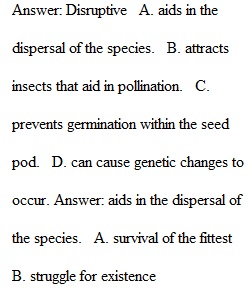


Q Complete the following and submit the Word document by midnight Sunday. Remember to include complete citations for all sources used to answer each question. 1. In _____________ selection, individuals with both extreme forms of a trait are at a selective advantage. 2. The spotted touch-me-not, a flowering plant, has seed pods that burst open when touched and forcefully eject their seeds. Such an adaptation is favorable because it A. aids in the dispersal of the species. B. attracts insects that aid in pollination. C. prevents germination within the seed pod. D. can cause genetic changes to occur. 3. Which concept was not included in Charles Darwin's theory of natural selection? A. survival of the fittest B. struggle for existence C. overproduction of offspring D. punctuated equilibrium 4. Define microevolution. Explain how the bottleneck effect and the founder effect each affect microevolution. Be sure you demonstrate your understanding of these three concepts in your answer. 5. Because of prolonged drought, the trees on an island are producing nuts that are much smaller with thicker and harder shells. What will happen to the birds that depend on the nuts for food? Of the three general outcomes of natural selection, this example illustrates ____________ selection. 6. What is meant by “survival of the fittest” and how does it relate to evolution? Are these two concepts the same or different? Justify your answer and be sure to define both concepts adequately. 7. Define and compare natural and artificial selection, including the source of selection pressure and the traits selected for. Provide a specific example of each. 8. What is speciation in general? Briefly describe the difference between allopatric speciation and sympatric speciation. Be sure to include under what sort of conditions each type might occur. 9. Huntington's disease is a dominant disorder that causes progressive deterioration of brain cells and eventually death. Even though this is a fatal disease and a dominant one, it has persisted in the human population. Explain the reason that Huntington's has not been eliminated. (You will have to look up information on the disease paying special attention to the age at which it is expressed. It is important to understand the significance of this.) ________________________________________ The following Grading Rubric will be used to score your homework: Questions Expectation Points 1 Understands the possible outcomes of natural selection. 0-2 2-3 Understands evolutionary concepts. 0-4 4 Defines and explains the effect of genetic drift on microevolution. 0-4 5 Understands the possible outcomes of natural selection. 0-4 6 Differentiates between “survival of the fittest” and evolution. 0-4 7 Differentiates between natural and artificial selection. 0-4 8 Demonstrates an understanding of speciation and the ways it might occur. 0-5 9 Applies critical thinking skills to deduce why Huntington’s disease has not been eliminated. 0-3 TOTAL {{{{{{{{{{ 30 pts PreviousNext
View Related Questions